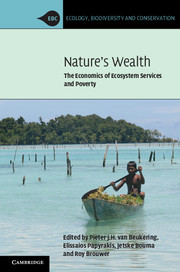Book contents
- Frontmatter
- Contents
- List of contributors
- Acknowledgements
- 1 The economics of ecosystem services and poverty
- Part I Biodiversity-related ecosystem services
- Part II Marine-related ecosystem services
- 5 The role of marine protected areas in alleviating poverty in the Asia-Pacific
- 6 Economics of conservation for the Hon Mun Marine Protected Area in Vietnam
- 7 A multi-criteria approach to equitable fishing rights allocation in South Africa’s Western Cape
- Part III Forest-related ecosystem services
- Part IV Water-related ecosystem services
- Part V Land-related ecosystem services
- Index
- References
7 - A multi-criteria approach to equitable fishing rights allocation in South Africa’s Western Cape
Published online by Cambridge University Press: 05 July 2013
- Frontmatter
- Contents
- List of contributors
- Acknowledgements
- 1 The economics of ecosystem services and poverty
- Part I Biodiversity-related ecosystem services
- Part II Marine-related ecosystem services
- 5 The role of marine protected areas in alleviating poverty in the Asia-Pacific
- 6 Economics of conservation for the Hon Mun Marine Protected Area in Vietnam
- 7 A multi-criteria approach to equitable fishing rights allocation in South Africa’s Western Cape
- Part III Forest-related ecosystem services
- Part IV Water-related ecosystem services
- Part V Land-related ecosystem services
- Index
- References
Summary
Introduction
Fisheries resources are vulnerable to overexploitation, in large part because of their open-access nature. For long-term ecological and socio-economic sustainability, fisheries therefore need to be regulated by limiting TAC and/or Total Allowable Effort (TAE). It can be argued that to maximize the efficiency of the fisheries sector tradable fishing rights is the way to go. This is the solution implemented successfully in countries such as Iceland, New Zealand, etc. (Arnason 2005, Scott 2000). In many developing countries, however, protection of traditional fishing communities with their subsistence fisheries is added. Objectives of fishing rights allocation can then include poverty reduction and preservation of traditional culture.
This study deals with the fishing rights allocation in South Africa. South Africa’s fisheries yields peaked in the 1960s and 1970s, but since then many stocks have declined due to overexploitation. Although the fishing industry has historically been dominated by a few white-owned companies, since the end of apartheid new policies have been introduced to (1) rectify this inequitable distribution of fishing opportunities and (2) improve the sustainability of fisheries (Cockcroft et al. 2002, RSA 1998).
- Type
- Chapter
- Information
- Nature's WealthThe Economics of Ecosystem Services and Poverty, pp. 155 - 172Publisher: Cambridge University PressPrint publication year: 2013

